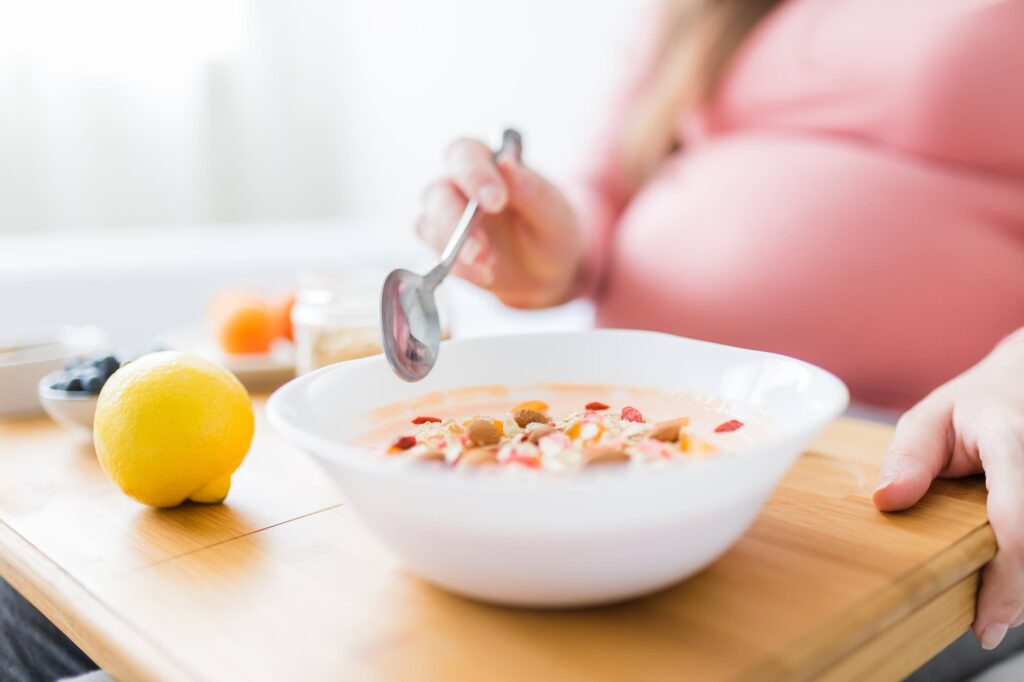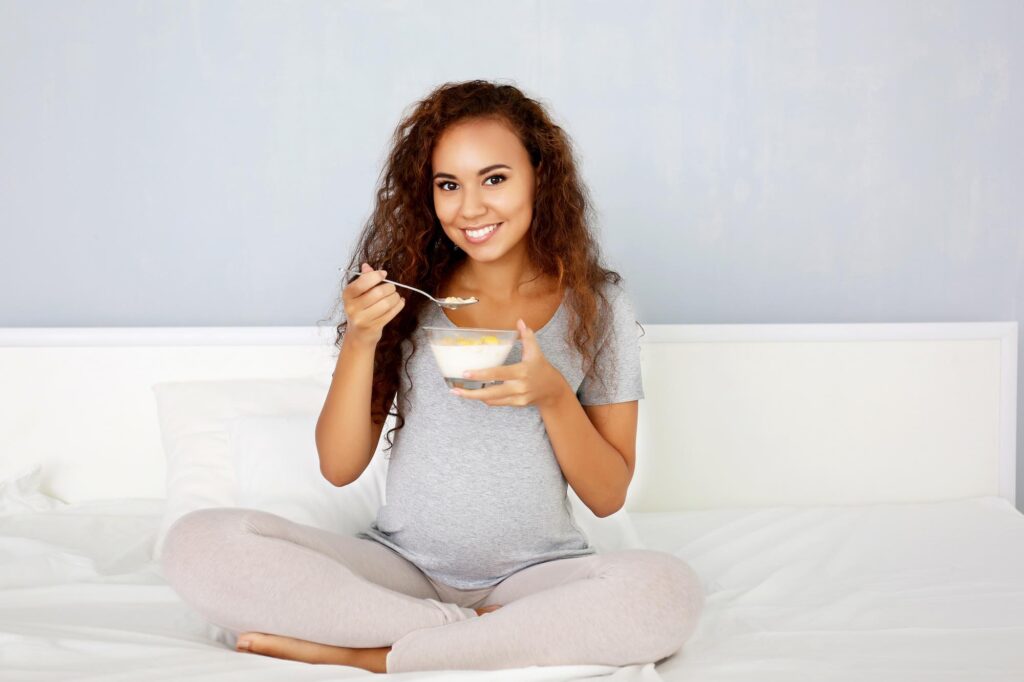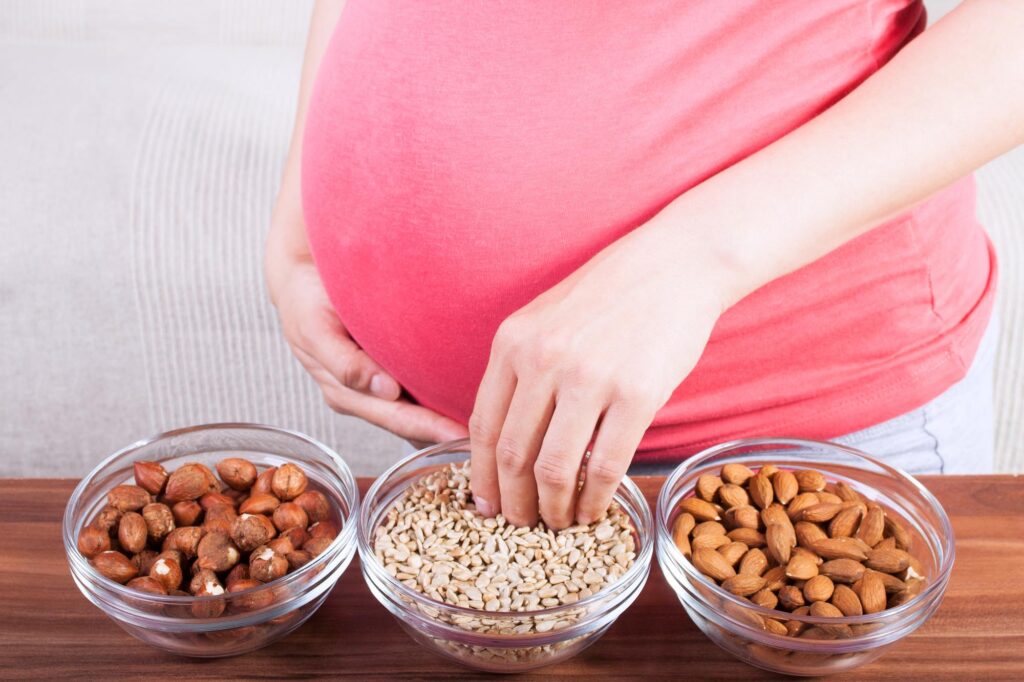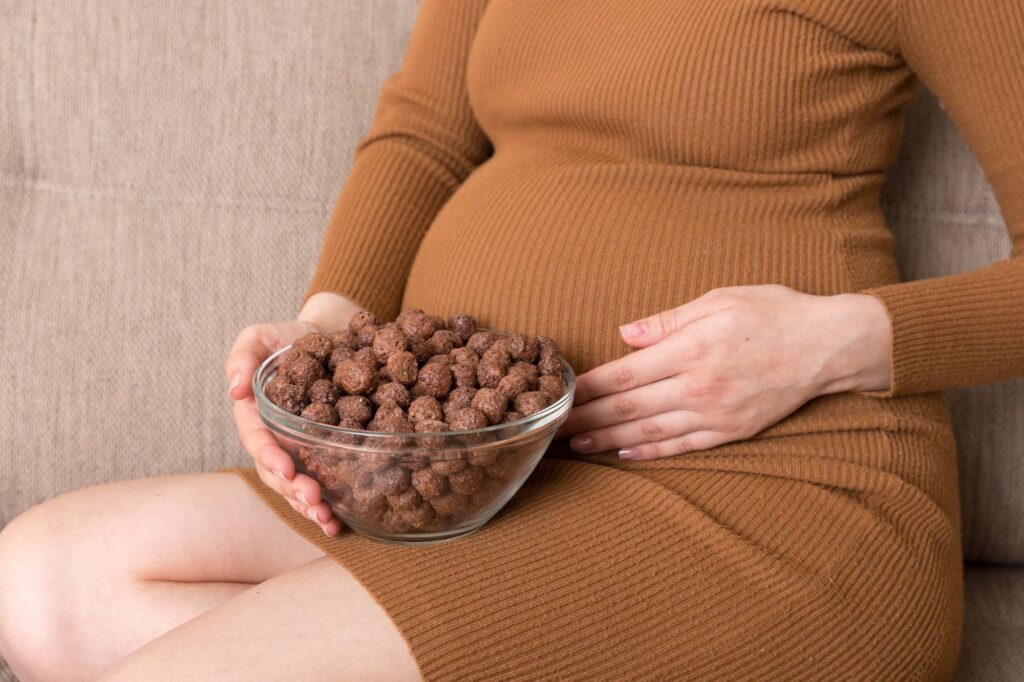Eating the right cereal during pregnancy can significantly affect the health and wellbeing of both the mother and the baby. With a plethora of options available in the market, selecting the best cereal for pregnancy that caters to the nutritional needs of pregnant women can be quite challenging. This blog post aims to make this process easier by providing a comprehensive guide on what to look for and what to avoid when choosing cereals for a healthy pregnancy.
Embarking on this cereal exploration, readers will learn about the importance of nutrient content, added sugars, and whole grains in the best cereal for pregnancy. They will also discover the top 5 recommended cereals for pregnant women, understand the pros and cons of fortified cereals, and explore gluten-free and vegan cereal options. Additionally, tips for enhancing cereal consumption and managing cereal cravings will be shared, along with suggestions for complementary foods and potential risks and precautions to keep in mind.
Key Takeaways
- Choose a cereal for pregnancy that is high in fiber, folic acid and iron with less than 10g of added sugar.
- Consider whole grain cereals to provide essential vitamins, minerals and protein.
- Read labels carefully to make informed decisions about your cereal consumption during pregnancy.
Choosing the Right Cereal for Pregnancy

Cereals, when chosen wisely, can be an integral part of a pregnant woman’s diet, providing essential nutrients to both the mother and the baby. Moreover, cereals can help regulate blood sugar and blood pressure, as well as manage weight during pregnancy. The best cereal for pregnancy should be:
- High in fiber
- High in folic acid
- High in iron
- Less than 10g of added sugar per serving
Whole grain oats, for instance, can be an excellent option as they are high in fiber and provide other essential nutrients.
However, not all cereals are created equal. Popular choices like Cinnamon Toast Crunch may seem appealing, but they might not be the most nutritious option for expectant mothers. To ensure a healthy pregnancy diet, it is important to consider the nutrient content, added sugars, and whole grains in the cereal selection process. This approach can help expectant mothers mitigate pregnancy complications and foster their baby’s health.
Nutrient Content
When it comes to cereals and pregnancy, the presence of fiber, folic acid, and iron is of utmost importance. Here are some reasons why:
- Fiber intake from grain oats may help reduce the likelihood of preeclampsia during pregnancy.
- Folic acid plays a crucial role in decreasing the probability of birth defects.
- Pregnant women should consume approximately twice the amount of iron compared to non-pregnant women, and cereals made from whole grain wheat flour can be a good source of iron.
When selecting a cereal, look for options that are fortified with iron and fiber, as they can assist pregnant women in fulfilling their daily iron and fiber requirements. Adding vitamin C-rich foods like oranges to the meal can further enhance iron absorption, ensuring that the mother and the baby receive the much-needed nutrients.
Added Sugars
Sugar consumption should be monitored during pregnancy, as excessive intake may lead to weight gain and other health concerns. It is recommended that cereals should have no more than 10g of added sugar per serving. Honey Nut Cheerios, for example, contain less added sugar compared to other sugary cereals and can be a suitable option.
Another option to consider is Cascadian Farms Honey Nut O’s, which, despite containing added sugar, is organic and has slightly more protein. Quinoa, a high-protein, low-sugar alternative, can also be a great addition to the pregnancy diet.
Opting for breakfast cereal with less added sugar enables expectant mothers to keep their diet balanced and to foster a healthier pregnancy.
Whole Grains
Whole grain cereals offer essential nutrients and are a healthier option for pregnant women. They are abundant in vitamins, minerals, protein, oils, and fats. Whole grain cereals made from wheat, such as bran complete wheat flakes, provide a high fiber content, which is essential for a healthy pregnancy diet.
Choosing whole grain cereals allows expectant mothers to harness the nutritional benefits these cereals provide. Some popular whole grain cereal options include Grape Nuts and sesame seeds, both of which are high in fiber and healthy fats, contributing to a well-rounded pregnancy diet.
Top 5 Recommended Cereals for Pregnant Women

Navigating through the multitude of cereal options can be overwhelming, especially for expectant mothers who prioritize their baby’s health. To simplify the selection process, here are the top 5 best cereals for pregnancy recommended for pregnant women:
- Total Whole Grain Cereal: This cereal offers a complete range of essential vitamins and minerals, providing 100% of the daily value of various nutrients in just one serving.
- Muesli: A versatile and healthy cereal option that can be customized with various fruits, nuts, and seeds for added nutritional benefits.
- Multi Grain Cheerio Cereal: Gluten-free and containing real honey, this cereal is low in saturated fat, sugar, and corn starch, and high in nutrients like oat bran, vitamins, and minerals.
- Cascadian Farms Honey Nut O’s: With each serving containing 4g of fiber and 5g of protein, this cereal is both delicious and nutritious.
- General Mills Total Whole Grain Cereal: A popular and wholesome choice for pregnant women, this cereal provides essential nutrients for a healthy pregnancy.
Incorporating these cereals into one’s daily diet can guarantee the intake of necessary nutrients for a healthy pregnancy.
Fortified Cereals: Pros and Cons
Fortified cereals, which contain essential nutrients like folic acid and iron, are of great importance for pregnant women. Folic acid, for instance, can reduce the risk of birth defects of the baby’s brain and spine, and maintaining a healthy diet can help manage high blood pressure.
There are worries regarding the safety of fortified breakfast cereals. If such cereals are consumed with a prenatal vitamin, it could potentially lead to toxicity..
Despite these concerns, research suggests that women who consumed fortified cereal at least three times weekly around the time of conception had higher intakes of key micronutrients that support a healthy pregnancy. As a result, fortified cereals can be a valuable addition to a pregnant woman’s diet when consumed in moderation and with the guidance of a healthcare professional.
Gluten-Free and Vegan Cereal Options
Pregnant women with dietary restrictions need not worry, as there are plenty of gluten-free and vegan cereal options available. These cereals cater to the specific needs of expectant mothers who follow a gluten-free or vegan diet while still providing essential nutrients for a healthy pregnancy.
Some suitable cereal options for vegan pregnant women include Multi Grain Cheerios and Kellogg’s All Bran Complete Wheat Flakes. Gluten-free and vegan cereal options are generally high in fiber, vitamins, and minerals, and low in added sugars and saturated fats. Opting for these cereals allows expectant mothers with dietary restrictions to maintain a balanced and nutritious diet.
Tips for Enhancing Your Pregnancy Cereal

To further improve the nutritional value of your pregnancy cereal, consider incorporating fresh fruit, protein boosters, and milk alternatives. These additions not only enhance the taste and texture of your cereal but also provide added nutrients for a well-balanced pregnancy diet.
Adding Fresh Fruit
Integrating fresh fruit into your pregnancy cereal can supply vital nutrients and vitamins for both the mother and the unborn child. Additionally, it can impart a natural sweetness to the cereal without the need for added sugars. Some of the most beneficial fruits to add to your cereal are bananas, berries (such as strawberries, blueberries, and raspberries), and sliced apples.
When incorporating fresh fruit into your cereal, make sure to wash the fruit thoroughly before adding it to your meal. Moreover, cut the fruit into small, bite-sized pieces to ensure ease of consumption and even distribution of the fruit throughout your bowl of cereal as you eat cereal. This simple practice can enhance your overall experience of eating cereal.
Protein Boosters
Protein is a vital nutrient for pregnant women, as it assists in the growth and development of the fetus. Here are some protein-rich ingredients you can add to your cereal to enhance the nutritional value and support a balanced pregnancy diet:
- Nuts
- Seeds
- Nut butters
- Yogurt
Before making any significant changes to your diet during pregnancy, it is important to consult a healthcare provider or a registered dietitian to receive personalized advice and guidance on what is most beneficial for you and your baby.
Milk Alternatives
Milk alternatives like almond milk, coconut milk, oat milk, and soy milk can offer additional nutrients and variety to pregnant women’s cereal consumption. When selecting a milk alternative, evaluate the nutrient content and potential allergens to ensure that it is suitable for your nutritional needs and preferences.
Incorporating milk alternatives into your cereal not only adds a different taste and texture but also provides an opportunity to discover new flavors and nutrient sources during pregnancy.
Cereal Cravings and How to Manage Them

Desiring cereal during pregnancy is both entirely normal and safe. The key is to manage these cravings in a healthy manner and ensure that the cereal choices made are nutritious and beneficial for both the mother and the baby. Some strategies for controlling cereal cravings during pregnancy include having breakfast for dinner with a generous portion of cereal, maintaining a nutritious diet, and avoiding sugary cereals.
Dry cereal can also help alleviate nausea during pregnancy. Managing cereal cravings and choosing healthier options can help expectant mothers satisfy their cravings while maintaining a balanced diet that supports a healthy pregnancy.
Foods to Pair with Cereal for a Balanced Pregnancy Diet
To achieve a balanced pregnancy diet, consider pairing your cereal with complementary foods that provide essential nutrients such as fiber, iron, folate, calcium, and B vitamins. Some of the most suitable foods to accompany cereal include:
- Whole wheat bread
- Baked potatoes
- Oat cereal
- Bran cereal
- Cornmeal
- Enriched pasta
- Enriched rice
- Legumes (such as beans, lentils, and peas)
- Fortified foods like breakfast cereals
- Yogurt
- Oranges
- Bananas
- Leafy greens
- Nut butters
Incorporating a variety of these foods into your diet ensures that you obtain all the essential nutrients for a healthy pregnancy. To make your meals more interesting and enjoyable, strive to include a variety of colors and textures in your food choices.
Potential Risks and Precautions
While cereals can provide numerous health benefits during pregnancy, there are potential risks associated with their consumption, such as nutritional deficiency-related diseases. Pregnant women should be aware of these risks and take necessary precautions when choosing a cereal for their pregnancy diet.
Moreover, other potential risks during pregnancy, like alcohol consumption and the intake of certain artificial sweeteners like saccharine, should also be taken into consideration. Always consult with a healthcare provider or a registered dietitian before making any significant changes to your diet during pregnancy to ensure the safety and wellbeing of both the mother and the baby.
How to Read Cereal Labels for Pregnancy
Understanding how to read cereal labels is key to making informed choices for a healthy pregnancy diet. Pregnant women should be aware of cereals that are nutritious, high in fiber, and low in sugar. Additionally, assess the food labels for the amount of folic acid and other essential nutrients, especially when considering fortified cereals.
Examine the ingredient list and nutritional information on the packaging to ensure that the cereal you choose aligns with your pregnancy nutritional goals. Understanding how to read cereal labels enables expectant mothers to make informed decisions about their cereal consumption, thus maintaining a balanced pregnancy diet.
Summary
In conclusion, choosing the right cereal for pregnancy is crucial for the health and wellbeing of both the mother and the baby. By focusing on nutrient content, added sugars, and whole grains, pregnant women can ensure they are consuming the best cereals for a healthy pregnancy. Exploring fortified cereals, gluten-free and vegan options, and tips for enhancing cereal consumption can further support a well-rounded pregnancy diet.
By understanding the importance of cereal selection during pregnancy and following the guidelines provided in this blog post, expectant mothers can confidently navigate their cereal choices, manage their cravings, and maintain a balanced diet that supports a healthy pregnancy and the development of their baby.
Frequently Asked Questions
Can cereal be healthy for pregnancy breakfast?
Cereals are a healthy choice for pregnant women due to their high contents of carbohydrates, fiber, vitamins, and minerals, as well as their potential in helping reduce constipation and risk of birth defects. They can also provide essential nutrients such as folic acid and iron during pregnancy.
What is the best milk to drink while pregnant?
When pregnant, it’s best to drink non-fat or low-fat cow’s milk, as it has the recommended amounts of calcium and reduced saturated fat. This helps reduce intake of saturated fats and ensure an adequate supply of calcium for your baby.
What cereal is good for morning sickness?
If you’re experiencing morning sickness, dry cereals like Cheerio





